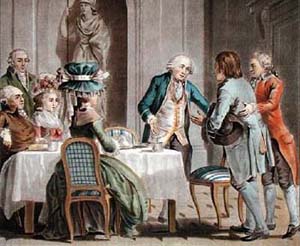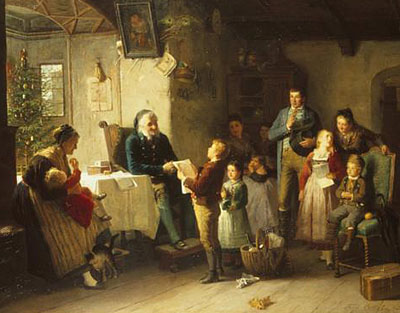 |
Formation of Children
Amiability
Marian T. Horvat, Ph.D.
It is easy to confuse amiability with softness, e.g. the smiling fellow who wants to be liked and avoids confrontations at all cost. As our Chapter 15 of the Manual of Civility points out, this is not the amiability of the Catholic man. For him, the first rule of amiability is the willingness to sacrifice himself to please others in order to lead them on the path of Our Lord Jesus Christ.
The amiable man knows how to repress a sign of impatience. He never fails to correct, but knows how to do so with kindness. Instead of barking out commands, he adds a word of benevolence when giving orders. In preference to always imposing his tastes, he studies and tries to satisfy the likings of those with whom he lives. Such amiability is a sign of self-discipline and strength of spirit, not weakness. The truly amiable man will always be both respected and admired in the home and the workplace.
Here is chapter 15 of the Small Manual of Civility.
The virtue of amiability is most rare, because it demands apparently inglorious sacrifices and constantly puts brakes on our egoism. The best dictionaries either fail to define it or give inadequate definitions. A common starting point for characterizing amiability is the desire to please. This definition, however, still needs to be developed.

The Count de Vaux offers food and drink to a farmer
Jean Baptiste Morret, c. 1800 |
To be amiable is to forget oneself with the aim of pleasing another. Even more: the amiable man will sacrifice himself in order to offer a legitimate satisfaction or pleasure to other members of society.
We can consider humanity as divided into two camps. In the first are those who struggle for their own interests, at times to the detriment of the good, interests and satisfaction of others. In the second are those who defer their own personal comfort, even if it means some sacrifice on their part, for the greater good of their fellow men to lead them on the path of Our Lord. In this last group we find the Saints, benevolent souls who, following the precepts of God, seek the good of humanity, and apostles of Catholic charity under diverse forms.
Amiability is what conquers
The amiable man has the great joy of sacrificing himself for the love of God. Doing so, he lives not only for himself, but also in the hearts of his fellow men, by harmonizing his desires, concerns, will, sufferings and sacrifices with theirs. At the base of amiability is a certain sympathy, whose most excellent degree of expression is Catholic esteem.
How does the amiable Catholic man act?
He accedes in inoffensive matters, assists in arduous jobs - even the most common - eliminates obstacles whenever possible, facilitates the work at hand, excuses shortcomings and deceptions, and interprets in the best sense everything that comes from his neighbor.
He is deferent and accommodating toward older persons, bringing them the things they need or removing obstacles from their pathway. He is attentive and kind to ladies, foreseeing their needs and carrying out their small requests and errands. He is friendly toward his colleagues, showing them constant dedication, offering them support in moments of difficulty, encouraging them in adversities and relieving them in their task load in those times.
With inferiors, he attends to their just requests, listens to their complaints, examines their demands with interest, and gives them unequivocal proof of his dedication and esteem.

A young man willingly offers a Christmas recitation to please his family
Friedrich Ortlieb |
Amiability can be excessive and carried too far. One should not be self-deprecating, insist on services that others do not want, or take initiatives of command or superiority that pique or irritate others.
Timidity, or excessive shyness, can also wound Catholic amiability. For example, one should not refuse to contribute to the good success of an undertaking because of lack of confidence in his own ability or valor. Nor should someone refuse solicitations to read a poem or a story, play an instrument or sing a song.
Some parents who ask their children to perform for guests make the mistake of excusing their children for being humble or shy if they refuse. Children should willingly perform at the command of the parent, having the will to give them, and others, pleasure. Just as inopportune audacity is condemnable, no less is a systematic refusal to do simple things that would please others. In fact, such refusals generally come from pride or vanity.
An amiable King

King Joao II of Portugal |
A man who showed great amiability on a certain occasion was the King of Portugal Dom John II (1455-1495). One day at the table he asked for a drink. An old knight, a veteran of his Africa campaigns, hastened to oblige him. It happened, however, that the glass escaped from his fingers at the very moment when he was presenting it to the Monarch.
The accident was greeted by laughter on the part of some courtesans. The face of the old knight was blushing in humiliation when the King intervened, his gaze turned severely on the merry makers.
“Why do you laugh?” he said. “Even if the glass fell now from the hand of this good knight, I can assure you that his lance did not fall in Africa!” With this reproof, the ones laughing were reprimanded and the old knight consoled.

Posted July 26, 2007


Related Topics of Interest
 Punctuality Punctuality
 Loyalty Loyalty
 Good and Bad Curiosity Good and Bad Curiosity
 Discretion in Words and Actions Discretion in Words and Actions
 Is Being Frank Always Advisable? Is Being Frank Always Advisable?
 The Voice - Speaking and Conversing The Voice - Speaking and Conversing
 The Art of Governing the Hands and Feet The Art of Governing the Hands and Feet
 The Importance of the Greeting The Importance of the Greeting
 The Smile, The Laugh, The Grimace The Smile, The Laugh, The Grimace
 Cleanliness and Good Hygiene Cleanliness and Good Hygiene

Related Works of Interest
|
|
Formation | Cultural | Home | Books | CDs | Search | Contact Us | Donate

© 2002- Tradition in Action, Inc. All Rights Reserved
|
 |
|